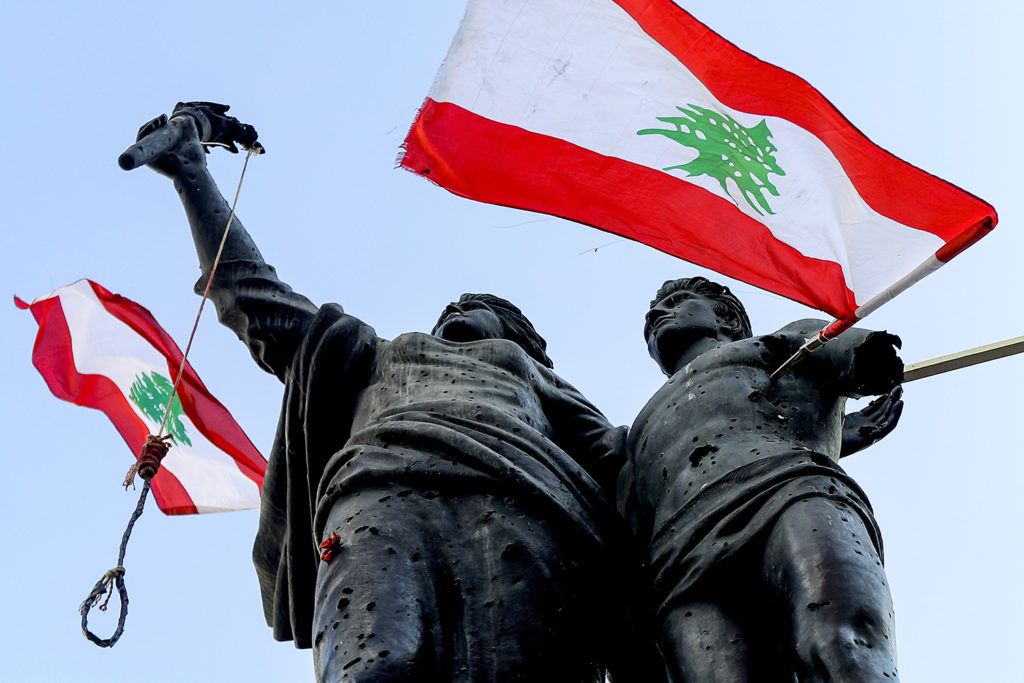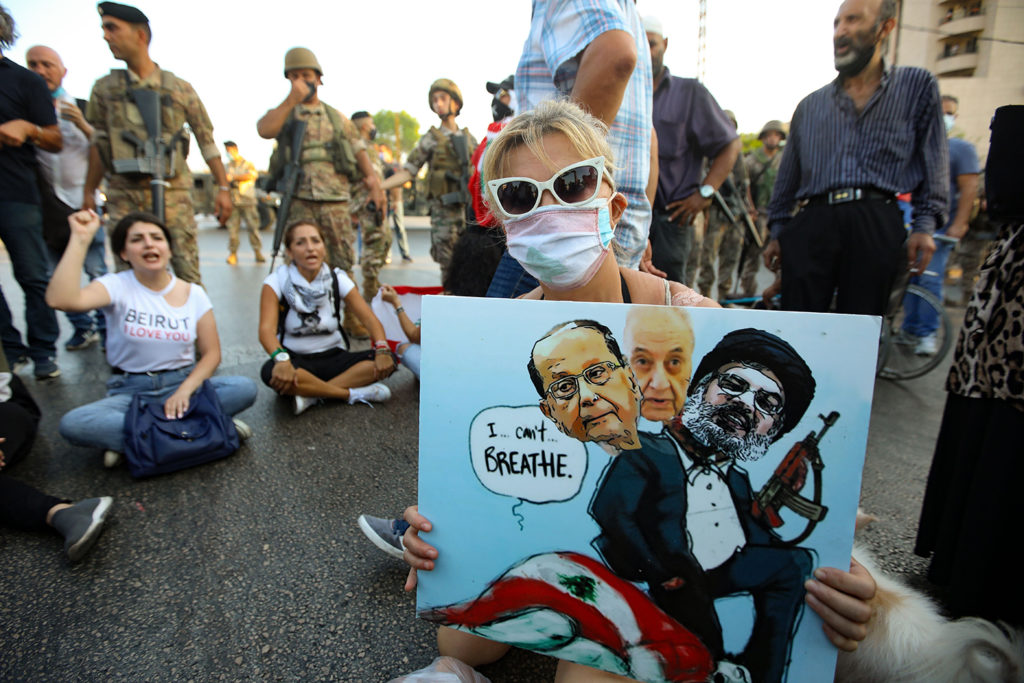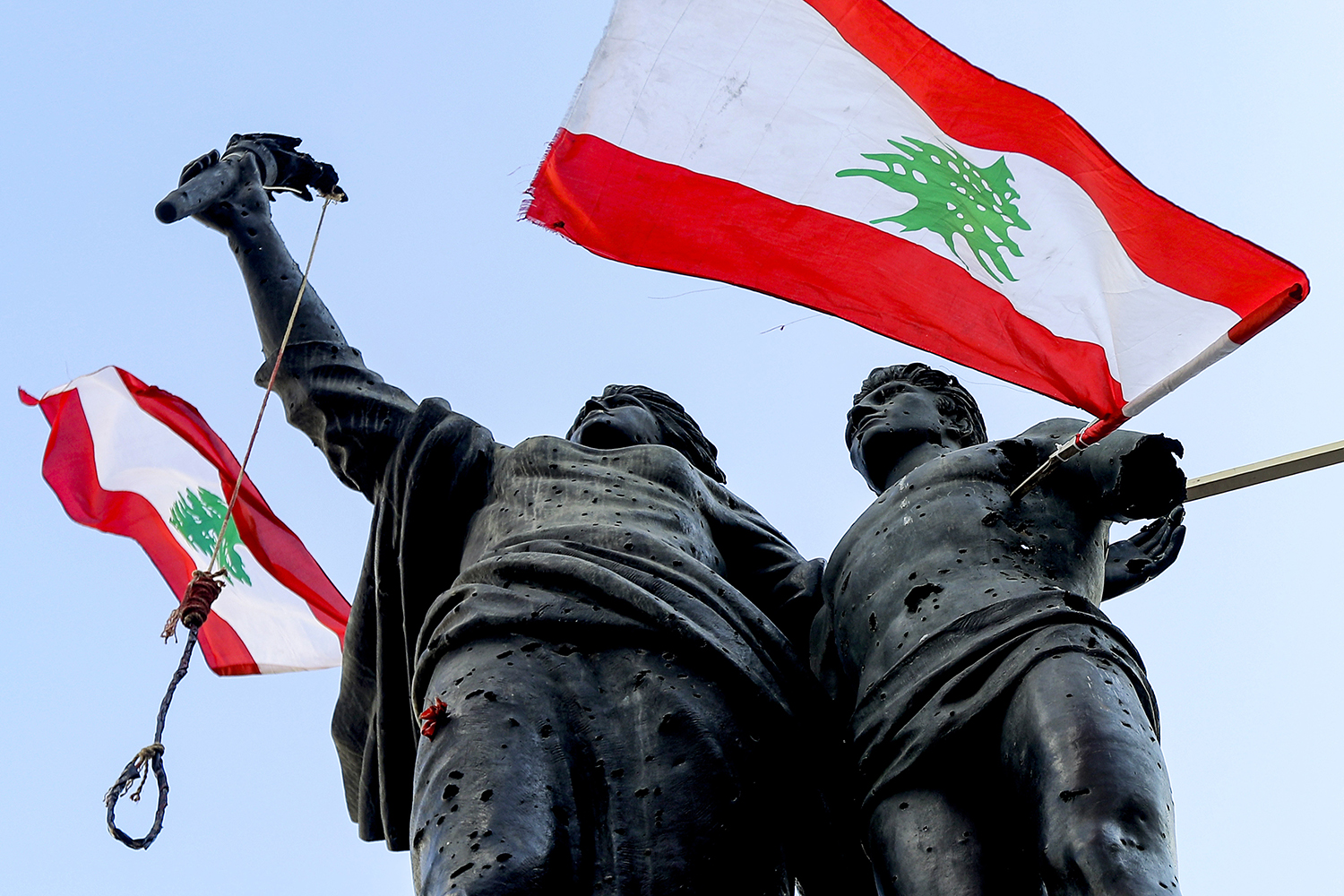Hezbollah’s dominance has deprived the majority of Lebanese of a voice in their own country. It is time to reconsider a century of consociational democracy and return to a form of federalism.

Lebanon is an ancient land that is mentioned 71 times in the Old Testament; the current geopolitical entity that bears that name, which was created in September 1920 by the French government, has survived for a century—but barely.
Over the course of that century, Lebanon lived through two civil wars, two foreign occupations, and assorted calamities while being plagued by corruption and substantial losses of liberties. Regrettably, all nation-building efforts came to naught, as political and religious leaders raised fresh power-sharing formulas. These ranged the gamut from federalism to partition, as the Lebanese, Christians, Druze, Sunni Muslims, and Shiite Muslims repeatedly rejected “communal coexistence”—a colloquial expression that is frequently used but lost meaning some time ago. After 100 years, many Lebanese are asking themselves: Why continue to live a lie?
In 1920, French Gen. Henri Gouraud was optimistic and, along with the Catholic Maronite Patriarch Elias Hoayek and Sunni Grand Mufti Sheikh Mustafa Naja, expanded the predominantly Christian-inhabited Mount Lebanon by creating a new geographical entity, which the French official and the two clerics named Greater Lebanon. They added the coastal towns of Beirut (then chiefly Greek Orthodox); Tripoli, Sidon, Tyre, and their hinterlands (then mostly Sunni); and the Bekaa Valley(whose populations included Shiites, Sunnis, and Christians).
Overnight, Mount Lebanon’s 80 percent Christian majority was reduced to 55 percent, which was the basis of flawed political apportionments on Sept. 1, 1920. Importantly, a demographic parity was reached between Muslims and Christians as early as 1943, when Lebanon gained formal independence.
The country made a crucial error by preserving an unwritten sectarian system that granted the top posts of the presidency to Maronites, the premiership to Sunnis, and the speakership of parliament to Shiites.
The French believed that power sharing would best serve the new republic, granting the three leading religious communities high-level posts.
All 18 officially recognized religious communities were allocated specific positions that, in effect, created a unique democracy based on consociationalism. A consociational state rests on a carefully divided internal setup along ethnic, religious, or linguistic lines, with none of the divisions large enough to form a majority group that would or even could dominate the rest, but which remains relatively stable because leaders consult among each other to maintain a balance of power. In Lebanon’s case, consociationalism was meant to maintain internal stability among the newly created state’s Christian and Muslim elites.
Christians promised to maintain distance from Western protectors, and Muslims pledged to forgo attachment to Syria, though only Georges Naccache, a Renaissance man par excellence, lamented this so-called National Pact as a “double negative.” In 1949, Naccache wrote that “two negations don’t make a nation,” an affirmation that was repeatedly overlooked during the country’s civil wars.
Over time, the Lebanese reached new accords, such as the 1989 Saudi-brokered Taif Agreement, which suspended the civil war and put an end successive Syrian and Israeli invasions. The Taif Agreement called for a return to political normalcy and reasserted Lebanese authority in southern Lebanon (then controlled by Israel and its South Lebanese Army allies). It also stipulated that the Syrian army withdraw within two years, though the actual withdrawal did not occur until 2005.

United Nations resolutions, along with U.N. peacekeeping troops that have now been deployed for more than four decades, mostly kept the peace on the southern border. Syrian occupying troops imposed peace from 1990 until 2005, even if Damascus emasculated every Lebanese political and security institution by encouraging the creation of the Iranian-backed Hezbollah militia as a state within the state.
Remarkably, after Syrian troops were withdrawn in 2005, Syrian President Bashar al-Assad’s Baath Party retained its intelligence operatives in Lebanon who, among other things, dominated local politics. Their grip was so strong that Damascus surfed through its own post-2011 civil war relatively unscathed, using Lebanon as a conduit for every imaginable good and service while it relied on Hezbollah for both warfare and terrorism.
Unwilling to preserve and protect their country’s sovereignty, Lebanese merchant-politicians such as Walid Jumblatt and former Foreign Minister Gebran Bassil, both of whom owned dozens of companies and media outlets—saw fresh opportunities in Syria, while Hezbollah executed Iranian orders to provide troops and prop up increasingly challenged governments in both countries.
A century is a very long time for a failed experiment in nation-building. What 100 years of neglect and greed produced were immense contradictions, as relative poverty and extreme wealth existed side by side. When functional unemployment increased, for example, it was quickly camouflaged through sectarian corruption, as party bosses and other power brokers disbursed generous financial donations to smother social unrest. Simultaneously, most of the nearly 1 million Lebanese workers toiling overseas dutifully transferred hard-earned salaries year in and year out. Their remittances ensured the creation of a first-rate banking Ponzi schemethat enriched the superwealthy while it provided the illusion of prosperity to the middle class.
In fact, expatriate Lebanese workers helped keep their native land afloat, sending $7 billion to $8 billion in annual remittances—which amounted to 18 percent of gross domestic product when the economy was riding high in 2010 and were deposited in local banks or earmarked to buy property. Local banks offered high interest rates, ranging from 6 to 12 percent—and sometimes reaching 15 to 20 percent—with the full approval of the central bank that had kept the lira stable at 1,507 to the dollar since 1997, though the currency spiraled downward to around 10,000 to the dollar on the black market a few months ago (and was back down to 7,600 as of this writing).
Today, capital controls have locked up dollars in bank accounts, uniting both rich and poor in anger, with many businesses no longer accepting card payments. Most Lebanese believed that their steadily growing bank accounts were safe and that they would be allowed to enjoy life—oblivious to sophisticated mechanisms introduced by incredibly savvy pilferers.
Organized corruption melted most savings as banks ran out of dollars and paid out dollar accounts in Lebanese lira first at the 2,600 lira rate before settling at 3,900 lira to the dollar, at a time when a dollar fetched 8,000 lira on the black market. Inflation galloped, prices skyrocketed, unemployment increased, emigration exploded, poverty settled in for at least 50 percent of the population, and the Lebanese lira lost nearly 80 percent of its value in less than a year.
Beyond the explosions that rocked Beirut on Aug. 4, beyond successive economic crises that impoverished a large majority of the Lebanese, and beyond the continued hijacking of political life by one of the most corrupt ruling establishments anywhere on the planet, Lebanon is now confronting its thirsty post-1920 demons.
In the words of Salim Badaoui, a French-educated Lebanese journalist, “the 1943 National Pact was dead and the 1989 Ta’if Accords were no longer viable,” even if Lebanese Shiites were now openly calling for a constitutional convention that would presumably reach a new power-sharing accord. “It was imperative … not to accept a new Iranian-sponsored Ta’if since that would be based on excessive Shiite power. Lebanon would disappear,” Badaoui wrote in his 2019 opus Marounia: Une identité en péril.
Foreign Policy


Leave a Reply
You must be logged in to post a comment.